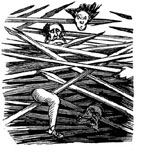
I Am Iraq
WILL THEY NEVER LEARN?
I am Iraq. I am old, and I am sad. Iraq is pronounced EE-RAQ, not EYE-RAQ. Actually, Iraq is not my real name. This name was given to me by the British at the end of World War I when, having defeated the Ottoman Empire (usually referred to as the Turks) with the help of the French and other allies, including the U.S., which joined in toward the end, they carved up the ancient Middle East, and created kingdoms for those whom they believed to be their friends. It was now payday for the Hashemi desert family in “Iraq,” who had helped them against the Turks.
East of the Jordan River they created the kingdom of Jordan; on the Arabian peninsula they created the kingdom of Saudi Arabia; and I became the kingdom of Iraq. Syria also became a kingdom, under French control. All this was done in accordance with a so-called League of Nations “mandate.” They had no problem finding suitable profit-motivated family members to become kings, and the dynasties they created still rule in Jordan and Saudi Arabia. I was a kingdom for some 40 years. My first King was Feisal I, who had originally been appointed King of Syria; he survived, with British support, until his death in 1933. Since there was no apparent heir, I was ruled by a regency until Feisal’s grandson, who became Feisal II, took over in 1953. Kings who are appointed usually have rivals and enemies, and Feisal II was assassinated in 1958.
But please allow me to go back to earlier and better days. I said that I was very old; in fact, I am one of the oldest countries on earth. Would you believe that some 10,000 years ago I was very beautiful, very rich, and very fertile? I was so fertile and so beautiful that the Supreme Creator, God, Jehovah, Yahweh, Allah, selected me as the location for the Garden of Eden, which you may have read about in the Bible, or in the Q’ran. I was blessed with fertile soil, two great rivers, and wetlands teeming with fish. My people were highly creative and very industrious. I was called Babylonia some 6,000 years ago, and my Chaldean people invented the wheel — initially the potter’s wheel, which led to many other uses, including transportation. My Sumerian people invented the first concepts of converting sound to visual form; they invented writing, and you can still see and read their work in museums throughout the world. Their system or style of writing is called cuneiform, from the Latin cuneus, a wedge — the basic shape of their alphabet. My beautiful capital city was a center of mathematics, music, and culture; you may have heard of the Hanging Gardens of Babylon, one of the seven wonders of the ancient world. I have been called the “cradle of civilization.”
And I produced many great sons. A thousand years ago, the Khalifa of Baghdad was the supreme leader of all Islam — from Mecca to the Pillars of Hercules and the great Islamic cities of Córdoba and Granada — but the greatest of all my sons was Abram or Abraham, the father of Judaism, Islam, and Christianity.
You May Also Enjoy
Allah's laws and actions do not have to be reasonable; they simply have to be obeyed. Religious obligation flows not from reason or moral philosophy but from sharia law.
Our friends are being squeezed by the vise of Islamic extremism and by the incomprehensible, inescapable grip of U.S. federal bureaucracy.
It is time for the Catholic faithful to question the Church's interreligious efforts vis-à-vis Islam, with respect to its goals and choice of dialogue partners.

